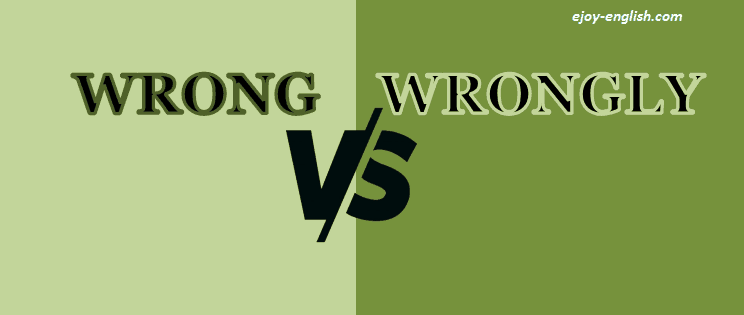Can you tell me which word to use in this sentence? Wrong? Wrongly? Or both? If you are so confused about how to tell the difference between wrong and wrongly, then this blog is for you. After that, you can confidently tell me what should I use in this case.
First of all, let’s have a deeper understanding of each of these words.
Read more
Wrong
We all know about wrong as an antonym of right. Hence, we can easily define wrong as ‘not right’. But there are more about the word wrong you need to know other than that.
If Wrong was a guy, “he” would be a bad boy. “He” can “act” like an adjective, an adverb, a noun, or a verb. Seriously, what kind of “person” you actually are, Wrong?
Wrong as an adjective
When being an adjective, Wrong has 4 meanings.
One of them, most of you could possibly know, is ‘not correct’. If something is wrong, it is not correct. If someone is wrong, they are not correct in their opinion, or assessment about something. In case you want to be more specific, you can use these phrases: ‘be wrong about sth/ be wrong in doing sth’.
Ex:
- Your answer is completely wrong.
- You give him the wrong facts about the event.
- I was so wrong in giving him the second chance.
Another definition of wrong as an adjective is ‘not suitable or not in a way that should’ve been done’.
Ex:
- I was so nervous that I got in the wrong room.
- What’s wrong with you today, Brian? (= What makes you worrying/ upsetting today, Brian?)
- We all laughed out loud when seeing Freddie dressed his t-shirt the wrong way round on stage. (the wrong way round = the part that should be at the front is at the back)
If something is morally unacceptable, you can say that it’s wrong.
Ex:
- He had wrong behaviors when talking to his teacher.
- Children should be taught that lying is wrong.
Wrong can also mean ‘not working’. But we don’t say a machine, a piece of equipment or a device is wrong if it doesn’t work. Instead, we say ‘there’s something wrong with it’ or ‘what’s wrong with it’.
Ex:
- There must be something wrong with the TV.
Wrong as a noun
Being a noun, wrong refers to moral respect.
Wrong means what is not morally acceptable in general, not particularly anything. And because it’s general, wrong is an uncountable noun.
Ex:
- That criminal has no sense of right and wrong.
Besides, wrong can also be a countable noun when it is used with the meaning of ‘an immoral or unequal action’.
Ex:
- You can never undo the wrongs you’ve done.
Wrong as an adverb
As an adverb, wrong means ‘in a way that is not correct’.
Ex:
- You have spelled my name wrong.
- Our TV keeps going wrong.
Wrong as a verb
Used as a verb, wrong is defined as ‘to treat someone unfairly or unacceptably’
Ex:
- Hedwig felt like he had been wronged by the whole team after he made that mistake.
Wrongly
Fortunately, wrongly doesn’t have so many meanings and word classes like wrong. Wrongly is only an adverb and has the only definition of ‘not correctly’.
Ex:
- You have spelled my name wrongly.
- Dennis was wrongly diagnosed as having diarrhea.
Difference between Wrong and Wrongly
Now it’s time for the most interesting part. After having explored each and every meaning of both words, you must be more than ready to find out the difference between wrong and wrongly.
Word class
In the word-class aspect, the difference between wrong and wrongly can be easily spotted.
Wrong can be an adjective, an adverb, a noun, and a verb, while wrongly can only be an adverb.

Meanings (when both being adverb)
You can apparently notice that when being adverbs, wrong and wrongly share the same meaning ‘in a way that is not correct’. However, that similarity causes a “deadly” misuse. You may think that you can use wrong as a replacement of wrongly, and vice versa. But wait, it isn’t true in all circumstances.
Wrong can only follow a verb (or the object of a verb, if any). This means you can only use wrong in active voice.
Ex:
- You have spelled my name wrong.
- Everything has gone wrong after Barry revealed about himself.
Unlike wrong, wrongly can precede verb and follow verb (or the object of a verb, if any). Therefore, wrongly can be used in both active voice and passive voice.
Ex:
- You have spelled my name wrongly.
- Dennis was wrongly diagnosed as having diarrhea.
In conclusion
= You have spelled my name wrong. Note: There are some specific phrases of wrong (don’t replace wrong with wrongly in these cases if you don’t want to change the meaning of the phrases)
=> |
Self-check quiz
Let’s check yourself how well you can perceive the difference between wrong and wrongly by doing the following exercise.
Choose the appropriate word: Wrong or Wrongly?
- Things might go wrong/ wrongly sometimes, but don’t be upset.
- Jade was wrong/ wrongly informed about the time of the conference.
- Don’t get me wrong/ wrongly, I just want to tell you the truth.
- Children must be taught about right and wrong/ wrongly.
- Casey answer the question wrong/ wrongly.
- They didn’t wrong/ wrongly Claire. She just overacted.
- Please do not spell the brand name wrong/ wrongly.
- He was wrong/ wrongly imprisoned.
Key:
- Wrong
- Wrongly
- Wrong
- Wrong
- Wrong/ wrongly
- Wrong
- Wrong/ wrongly
- Wrongly
And that’s how to tell the difference between wrong and wrongly. If you want to find out more confusing words in English like wrong and wrongly, I have a gift for you: A FREE Confusing Words ebook of eJOY. This is where you can explore numerous confusing words with literally 0$. So, what are you waiting for?
Download eJOY Confusing Words ebook for FREE
Before saying goodbye, do you still remember my question at the beginning? What should I use in that sentence? Wrong or wrongly? Don’t forget to give me a hint in the comment section. Thank you!















